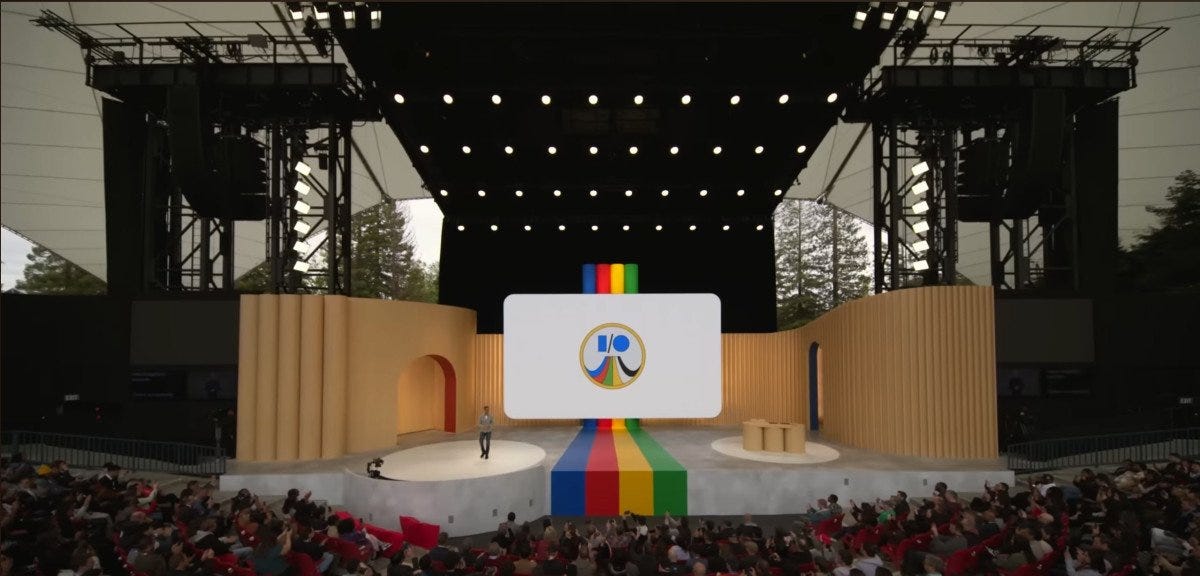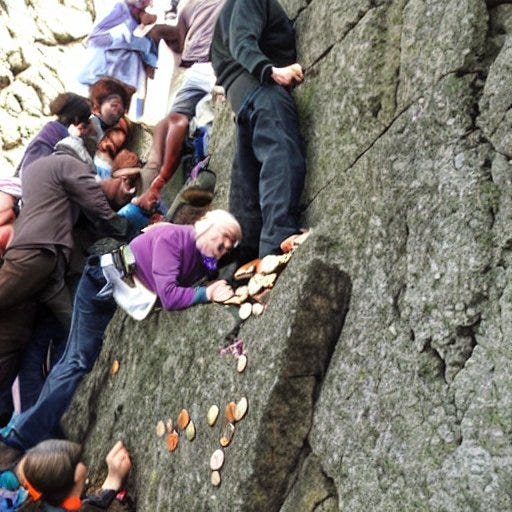...so let's be professional about this.
Cutting through human bullshit for the AI-generated truth.
This Week in Work: Whatever Tomorrow Brings, I’ll Be There
Google’s big yearly tech conference last week brought into sharp focus many of the themes that have dominated the creative marketplace over the past few months.
Shuffled in unassumingly with bootleg-future junk like foldable phones and 3D wallpapers and other things that would have been impressive in like 2005 was an unmistakable announcement:
Writing, as a craft, is pretty much dead.
Of course, they didn’t use those words…as a former copywriter, I know that makes terrible copy. First off, where’s the call to action?
Still, with the AI capabilities rolled out to the public to grand fanfare at last week’s conference, it’s easy to see that a lot of freelance contracts are about to be paused indefinitely.
For example, a commonly cited way to expand a writing skillset in recent years was through coding, but with Google’s new utility promising to generate flawless, usable code in over 20 programming languages with a simple prompt, any plans of hustling up big bucks by helping some digitally illiterate local business owner to establish a web presence were strangled in the crib.
Per my previous email, an addition to Gmail called “Help Me Write” will iron out all those inane office communication tropes of tone and text that apparently define the inner machinations of the modern workplace…should you need further clarification, please don’t hesitate to read on.
From an AI utility fluent in over 20 programming languages to a video auto-translation feature that even goes to the trouble of (actually not terribly!) altering mouth movements to match the new audio, the march of progress is in a full sprint this year.
Even recreational communication from texts to Tinder will benefit from a burst of artificial intelligence through Google’s latest set of superpowers.
Unfortunately, this means that freelance professionals from coders and voice actors to translators and accountants are about to find themselves shorter on clients as the tumultuous 2020s wear on. These latest developments in Big Tech demonstrate that some of the world’s most potent minds and deepest pockets have set their sights on a now-inevitable endgame: A major outsourcing of production processes to an effectively infinite pool of near-costless labor.
It worked when corporations responded to rising domestic wages and expanded labor protections by shipping manufacturing jobs overseas to the lesser-waged and protected peoples of our world, and all signs point to a similar opportunity with today’s intellectual goods. Difference is, nobody gets to clamber for the scattered coins this time.
It’s funny too…I can already hear my fellow freelancers whistling past the graveyard. They say things no one who speaks English should actually believe, making impassioned appeals to product quality and the human touch when grasping at straws to explain the recent shortage in parties willing to pay handsomely for a service that has now become close to free.
Anyone who actually believes that the major moneymongers of industry won’t pump out a product that’s about two-thirds as good at about one-tenth the price and cheerfully pocket the difference in revenue has somehow never tasted high-fructose corn syrup and hell, honestly that’s kind of impressive where I come from.

All jokes aside, there is so much ABYSMAL writing throughout our everyday lives in any direction you care to check that I’m actually kind of shocked that writers of all people can’t read the high-vis flashing script on every surface of society.
“What happened to all my clients lately?” Costless labor happened. There it is, unvarnished.
All that having been typed, I feel like what made me an excellent copywriter (back when that was a real job) was an ability to visualize calls to action that may not be immediately apparent. Then I wrote them down.
And so, the first edition of “This Was a Real Job” focused on my realization months ago that even taking into account the massive blow that AI has dealt to writing as a profitable craft, the art of writing has been delivered what I hope is a nearly equal blessing.
From where I’m sitting, AI is something for the most inspired among us to embrace…I’m incredibly fulfilled, in these Interesting Times, to believe that category includes me.
Instead of thinking of AI as the death of human creativity, the truly creative among us must refocus our energies on redefining what that concept entails. For me, that means seeing AI as more of an entirely new instrument to be played than a weapon to be feared.
AI draws from the ocean of existing Internet contact…which means that there is likely a degree of cross-pollination between a language learning model and those who model language. As we’ve certainly seen over the last couple of years, it is more productive to make sense of--and peace--with a new reality rather than building up walls of illogical resistance.
At least for now, AI is a coworker for the most capable composers…so I talk to it regularly though Chirper. I respond to every email AI generates in my direction. I work meticulously to carefully refine my prompts and produce the desired effects…like any good human writer.
Actually, the most trouble I’m having is coming up with a name for my new profession…”botmaster” has problematic hierarchical connotations, but I like the vibe…hmm let’s see, ”chat sculptor”...”input ranger”...wait, something colloquial like “dataman?” wait no that’s unnecessarily gendered.
Eh, I’ll settle that out later. You get the point.
I mean, let’s not add too much honey to the sauce here. The grunt work--the toilsome, sun-baked mud blocks that have formed the foundation for modern freelance careers for a generation--is gone.
Besides, I’m also not here to mourn my own exploitation. One time I ghostwrote an entire 10,000 word autobiography for a quick $60 because hey, the rent was due.
AI can have that gig in the future.
On the other hand, I have never felt more empowered to CREATE, to bring whatever visions banging around inside my head to life in a way not quite like anyone else currently drawing breath. There’s no use complaining that content mills and other sources of SEO-optimized bandwidth waste have become irrelevant overnight. No one will miss them, and we’re better off without.
Sure, most common in modern marketplaces are products like barley-flavored hard seltzer and gas station rose bouquets, but there’s still plenty of room on specialized shelves for craft beer and rare flowers…I’m the kind of creative that revels in exactly such things.
The saving grace of the burning creative at this time is that AI is entirely flavorless…you have to bring your own, and hope people love it.
With due regard to the latest from Google, that’s exactly what I plan to do.
Maybe Update Your Resume: Drake?

Not everyone is handling the latest developments in tech with such aplomb.
Contemporary human performer Drake is on record as strongly disappointed in the direction of AI after some Internet person created a song in his signature style, which you can listen to here if you must. Among fans, it has proven to be at least as popular as his original content
In an emotional social media post, the music-adjacent Drake laments the advance of AI…which, as I noted so extensively last segment, is a fool’s errand. There ain’t no stopping this train, particularly for someone whose contributions to the media landscape are so indistinct.
Besides, nobody complained about Elvis, the King of Content Aggregation.
On the other side of the coin, Grimes, another contemporary human performer, has taken a more sustainable view of her new role in the post-AI creative landscape. In a new statement, the reasonably popular singer has agreed to split any royalties from a successful AI-generated song featuring her voice, which seems like a pretty good deal for everyone involved.
Hell, I might take a swing at it, which would require that I ever listen to Grimes’ music in the first place…already we have some fantastically imaginative marketing hard at work.
By casting a keen eye exactly in Drake’s blind spot, Grimes makes actionable a key lesson that should have taken root in every member of the Napster generation: the mixed blessing of the open-source concept. You can’t stop anyone from publishing the secret recipe for the Confederate Colonel’s chicken, which is kinda cool, but you also can’t stop anyone from publishing the secret recipe for a dirty bomb in a Minecraft chat, which is kinda uncool.
You take the good with the bad in the 2020s.
With this cracked and cloudy crystal ball of mine, I can totally see a future where record labels (or hell, subreddits) fabricate pop stars from pure prompts (and recycled human resources), layering some never-born human face over crowdsourced lyrics and sending out costumed representatives to meet-and-greets. The model works for Santa Claus, and has applications here.
What remains to be seen is how the obviously forthcoming legal battles will shake out and what shape new ideas of creativity and intellectual ownership will take in the public mind and legal body…in the meantime, Drake will just have to do what he does best and be sad about it.
Color Commentary: Pricey Purple Prose
When I wrote a history of color in human handcraft disguised as a book about crayons, Lavender was a particularly controversial color choice.
Specifically, Big Crayon’s rendering of the shade wasn’t really what I pictured when the color comes to mind…for me, it’s more of an airy pastel purple than the dusty pink hue the manufacturer went with for their famous 64-color collection, but that’s a long story and there’s a whole separate Substack for that.

Instead, what I’m here to talk about today is Lavender as a marker of material circumstances.
Like other leisure essentials, readily available art supplies are among the first casualties when resources begin to run short in times of turmoil.
This was demonstrated in dramatic fashion with that very same set of crayons in the wake of the World War Era, as the 64-box only became possible as supply constraints began to ease; indeed the decade following the war’s nuclear conclusion saw over a dozen new colors added to the box.
Similarly, a sudden end to the age of plenty that has spanned the last few decades has begun to have tangible effects. Citing unavailability of materials, the manufacturer announced the discontinuing of two prized pigments: lavender and lilac for this year’s collection.
What is important to understand about purple pigmentation as it relates to the material circumstances that enable the stability of society is that purple is typically the most expensive dye color.
Once illegal for “commoners” to wear due to its rarity and expense, still tricky to source for the same reasons, premium purples are made with lavish materials such as ground lapis lazuli, crushed carmine, orchid extracts, and naturally, lavender plants.
To this day, none of that stuff comes cheap. Of course, alternate pencil colors have been devised for Prismacolor--slightly different, but noticeably so--and the expensive purple materials have retained their high value and will be reserved for the elites once more after a brief period of democratizatrion.
In any event, here we have an inherent admission from a major manufacturer than certain materials are now too expensive for children of any age to color with. The marketplace will no longer bear their use for this purpose…there’s no voodoo accounting around a simple lack of resources.

Hope Spot: A Second’s Sanity
Hope, I believe, is what gets us out of bed in the morning. The possibility of a positive outcome is why we put up with all the common obstacles to a life meaningfully lived instead of just tapping out and doing something way easier than laboring for our daily survival.
My idealistic suspicion is that many among us are driven by abstract ideas of a better future, even with extensive evidence to the contrary. We may know and understand all the factors that make our aspirations into unlikely results, but because of hope we act on our desires anyway.
It’s easy to think of hope as this soft, puffy, insubstantial thing when the odds are against what we want; a cloud of cotton candy in the pouring rain…but hope can take many different forms.
Sometimes hope gets pissed off, and that’s the sentiment that came across clearly when I recently heard a conversation with Dr. Peter Kalmus.When asked about steps a school-age child of the 2020s could take to defend their right to a future worth living through, the climate scientist spoke what he believed to be the truth.
This college-educated professional, bedecked in the credentials and social credit of his profession, effectively advised tomorrow’sparticularly passionate climate activists to take an almost unheard-of step: drop out of school and hit the streets IMMEDIATELY. He’s not exactly talking about making a sign or singing a song either…we’re talking full civic disruption, baseline.
Now, it’s controversial guidance to be sure…we can debate whether it’s right or wrong to advocate that today’s teenagers join the front lines of the war against climate change all day…give the whole thing a listen and decide for yourself.
What sits beyond any debate is whether he truly believes what he is saying.
Check it out: A lot of people claim to “believe” in climate breakdown. Most people, I’d wager.
They fit the words into their mouths, they simulate the appropriate concern, they got themselves the reusable shopping bag, the may even attend the right rallies…but look at the actions of those who claim to believe that “our current way of life at its current intensity is inherently unsustainable and must be radically altered near-term.” Do their actions reflect this belief?
If you actually “believe” in climate breakdown--the wholesale destruction of our biosphere within the lifespan of humans living today--doesn’t it make sense to encourage something a little stronger than polite discussions on the subject?
As I opined in a recent response to an AI-generated reader feedback submission, if you truly believe that your state’s capital city is going to be underwater in 5 years, why would you spend all 4 of them in the halls of your local high school?
What fucking sense does that make?
For better or worse, this is a human being who believes what he is saying, who has worked to gain a better understanding of the task at hand and is willing to discuss solutions that have been proven effective rather than just making comfortable conversation.
Even though they’ll (physically) be on the same planet as those who care the most about fighting extinction, most people will be still be planning ski trips after the first year with a monthlong winter. Their stake in the status quo makes them unable to envision any factor presenting a threat to their standing. They don’t believe in climate change. They just know the lyrics to the song.
Dr. Kalmus shares the stake while turning up the sentiment, and in a media landscape packed window to wall with half-truths, mitigations, and delusional-case-scenarios, it definitely gives me hope to see someone who’s not asleep at the wheel speaking out in a public forum…especially someone who can tell us down to the centimeter exactly the depth of the shit we’re in these days.
In the Century of Chaos, it’s nice to know that someone still knows how to do their damn job.











Great piece, AJ. You make some excellent points - In particular, when talking about content mills and the hollowing out of the freelance writing career - especially for people trying to get into the profession right now. It's why - if professional writers are to survive - that we must do so much more than "just" write.
I think your example of learning to use AI tools is a strong one. I'd also add that there are other skills that will be harder for AI to master - Project management, subject-matter expertise, content strategy, thought leadership - in other words, looking for the gaps between what AI can do now, and the human capacity to be original and creative.
Of course, it's likely only a matter of time before AI masters those areas as well - we'll have to keep being agile and adapt. After all, what's our alternative?